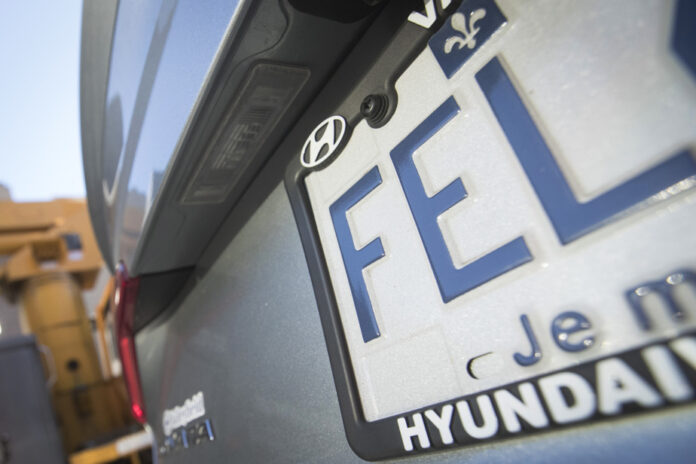Residents of the suburbs of Montreal will have to pay as of 2024 the registration tax imposed for more than 10 years on Montrealers to finance public transit. The amount charged to motorists will increase from $45 to $59. Fiercely opposed so far to such a measure affecting the 450, the Legault government responds today that this file falls under municipal autonomy.
The elected officials of the Metropolitan Community of Montreal (CMM) indeed adopted Thursday morning the regulation to extend the registration tax to the entire region as of January 1, 2024. For the time being, only Montrealers had to pay this tax since 2011. In a press release, the organization specifies that it will affect “any passenger vehicle in Greater Montreal”.
Incidentally, elected officials have decreed that the tax will increase from $45 to $59. It will apply to the island of Montreal and 82 surrounding municipalities, including Saint-Jérôme. The broadening and raising of the tax should make it possible to multiply by three to four times the revenues derived from it to finance public transit.
This tax had brought 37.3 million in 2022 to the City of Montreal, but the expanded measure should now bring in more than 125 million dollars, according to the calculation of the CMM. La Presse, however, calculates that revenues could even reach up to 139 million annually.
Montreal has already imposed this tax since 2011. The CMM had already been asking for several years that the tax be applied to the 450. In the rest of Greater Montreal, the implementation of this tax has been recommended by the CMM Transport Commission since February 2019 Its main goal is to “diversify the sources of revenue” in public transit.
The Legault government had so far opposed extending the tax to 450. “It’s no. There will be no $50 tax for motorists in the suburbs,” said François Bonnardel in 2020, then Minister of Transport, when the CMM wanted to impose it. Two years earlier, as soon as François Legault came to power, Chantal Rouleau, at the time Minister responsible for metropolitan France and Delegate for Transport, had replied that “it is not our intention to increase taxes citizens “.
There is more: in opposition, the Coalition avenir Québec had campaigned against the project of “possible expansion of the tax on registration” and asked the Liberal government to give up giving the CMM this power of taxation. . “The CAQ denounces a new tax for motorists of the 450,” she said, speaking of a “sneaky increase in taxation”. He even launched a website to denounce this measure (www. attachezvotreceinture. com, link which no longer exists today).
The office of the current Minister of Transport, Geneviève Guilbault, argues today that the law adopted under the Liberals in 2016 allows the CMM to extend the registration tax and that this issue falls within municipal autonomy. The Legault government will therefore let the CMM move forward.
Until now, however, the SAAQ had always said it was unable to extend the tax to the 450 due to computer issues. In February 2022, La Presse reported that this blockage resulted in 400 million less in four years being released for public transport.
It is that the distinction of vehicles registered in Montérégie, but outside the CMM, remains difficult. Slightly less than 30% of the population of the Montérégie, Laurentides and Lanaudière regions live outside the CMM.
However, an agreement has just been reached with the SAAQ in order to move forward. It is on this agreement that the elected officials of the CMM were called to vote on Thursday morning, and which they ratified by a majority. The SAAQ also confirmed on Thursday that it had informed the CMM that it will be able to “respond to the request for collection of the registration tax” by 2024, “the time to complete our digital transformation”.
The Metropolitan Community, on the other hand, claims that its registration tax is “more relevant than ever”, while the Regional Metropolitan Transport Authority (ARTM) “is facing a significant deficit due to the sharp drop ridership related to new travel habits exacerbated by the COVID-19 pandemic.
This fall, the ARTM had estimated its shortfall at around 500 million. The Urban Transport Association of Quebec (ATUQ) had also reported that the shortfall could reach 900 million within five years in Quebec. In March, however, Quebec offered emergency aid of 400 million to the industry, of which 340 million goes to the ARTM. The fact remains, however, that the ARTM’s financial framework will have to “integrate within a few months the operating and capital costs of several new projects, including the REM, the extension of the blue line of the metro and the commissioning of reserved lanes”, underlines the CMM. In addition, according to the CMM, “the share of municipalities and that of users in its financing have reached their maximum, while that of motorists is down and stands at 5%”.


















